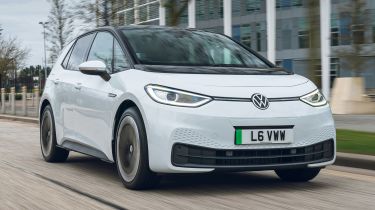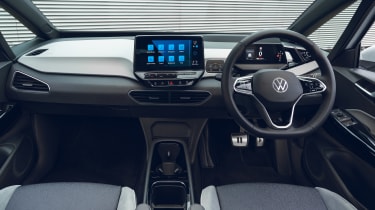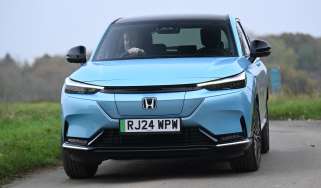New Volkswagen ID.3 Tour Pro S 2021 review
The new Volkswagen ID.3 Tour Pro S comes with a bigger 77kWh battery, but is it worth the extra cash?

Verdict
If you’re sure you’ll regularly need the extra range, this flagship ID.3 could appeal. It delivers the extra miles with the same solid driving dynamics and excellent practicality as the rest of the line-up. What it can’t quite escape is the extra expense that comes with more cells. That keeps it comfortably north of the Plug-in Car Grant, so it looks a little costly compared with more modest versions.
Is this where the VW ID.3 gets serious? We’ve had 1st Edition models so far, and Pro Performance variants, all with a 58kWh battery. But now here is the 77kWh (usable) version installed in the ID.3 variant that really targets long range: the Tour Pro S.
The fundamentals do not really change, of course. This is a five-door family hatchback – Golf-sized, which is no coincidence – and it sits on MEB, the VW Group’s modular fully electric platform. But instead of that Pro battery pack, with up to 263 miles of range, this Tour has the Pro S, which VW claims can keep the ID.3 running for up to 336 miles.
For now at least, Tour trim is the only way you can get the Pro S powertrain, and you’ll pay for it. This car retails at £42,600 – no Plug-in Car Grant here, then – well over £10k up on the entry point to the ID.3 range.
Used - available now
Aside from the extra distance between charges, though, you do at least get plenty of standard kit. There’s useful stuff, such as dual-zone air-con, keyless entry, a rear-view camera, matrix LED headlights, and electric adjustment on the front seats. There’s up to 125kW rapid charging as standard, too, allowing the car to get from five to 80 per cent of its charge in just under 40 minutes.
Then there are more, well, incidental additions to the equipment list – 19-inch alloys and 30 possible colours of interior ambient lighting, for example.
As you might expect, these trinkets have little effect on how the ID.3 behaves on the road. Unlike the cheaper but smaller-battery Max edition, the Tour Pro S doesn’t come with adaptive dampers – but it’s still far from unpleasant, even on 19-inch wheels.
Around town there’s enough compliance and you won’t hear any thunks or grumbles from the suspension – an important factor in a car that makes little more than a dull whine under hard acceleration.
At higher speeds the ID.3’s heft means it’s not exactly up for being thrown around, but you shouldn’t be troubled by most road surfaces. It’s a comfortable cruiser and swift enough, particularly when accelerating from rest. The 0-62mph dash takes 7.9 seconds – a modest figure for a pure-electric car, but then it’s worth remembering that the Tour Pro S has the same 201bhp rear-mounted electric motor as the bulk of the range, while carrying extra kilos due to its bigger battery. Its kerbweight is more than 1,900kg.
The rest of the dynamic make-up already feels familiar. This is a car that, in effect, replaces the e-Golf, and for all the snazzy cabin tech, it’s the sort of vehicle that would do a similarly good job of just melting into your everyday life. The extra practicality – strong rear legroom, to match the Golf-sized boot – helps further with this, too.
The extra range may help if you can plan your driving and identify situations where you know you’ll need it. Of course, you’re unlikely to hit the full 336 miles, but based on our (mainly urban) experience, just shy of 300 should be easily achievable.
This is also the first ID.3 we’ve tried with the much-touted augmented-reality head-up display system – deemed so important by the development team that accommodating its bulky projection box is said to have influenced the design of the MEB platform.
We’re not entirely convinced it’s worth the trouble – but it’s a neat enough bit of tech in practice. You get arrows pointing straight ahead when you’re following the in-built nav instructions; then as you approach a turning, the system points in the proposed direction of travel and these arrows grow in size until they are gesturing directly into the road in question.
It takes a little getting used to – to start with, it just seems like another thing to focus on, instead of a feature designed to make life easier. There’s an additional cue with a sweeping light across the dash in the direction of the sat-nav’s instruction, too.
Neither of these features can overcome the shortcomings of the ID.3’s cabin, though; some of the hardware (5.3-inch digital instrument panel and 10-inch infotainment screen) is impressive, but elements of the finish still feel a little cheap, and the removal of conventional controls for some key features, such as the heating and ventilation, still baffles us. The car may be a slow burner, but we’re struggling to see how this component will ever win us over.
| Model: | Volkswagen ID.3 Tour Pro S |
| Price: | £42,600 |
| Batt./motor: | 77kWh, single e-motor |
| Power/torque: | 201bhp/310Nm |
| Transmission: | Single-speed automatic, rear-wheel drive |
| 0-62mph: | 7.9 seconds |
| Top speed: | 99mph |
| Range: | 336 miles (WLTP) |
| Charging: | 125kW (5-80% in 38 mins) |
| On sale: | Now |
















